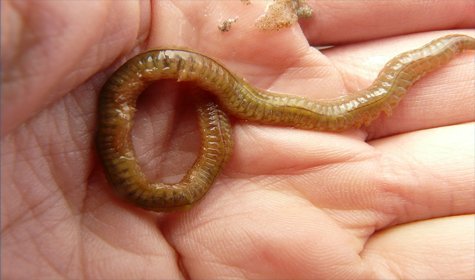Why should we care about earthworms? Most folks think about earthworms when they are heading to a stock tank to go fishing, and need some bait. Well maybe we should think again, because the earthworm is responsible for a lot of things that help keep our soil healthy enough to grow plants and provide food.
The Natural Resources Conservation Service (NRCS) is promoting soil health, and recognizes the importance of earthworms. Earthworms are the natural tillers of the earth and are like free farm help, albeit very tiny farm help. They help turn the soil by bringing down organic material (such as leaves and grasses) from the top and mixing it with the soil below. When they eat, they leave behind castings that are a very valuable type of fertilizer. These castings support a diverse microbial community that includes fungi and bacteria. If there are 500,000 worms living in an acre of soil, they could make up to 50 tons of castings. That is essentially like putting 100,000 one pound coffee cans filled with casings on your land.
Earthworms help to increase the amount of air and water that gets into the soils too. These same 500,000 worms that are burrowing throughout your land, also create a drainage system equal to 2,000 ft. of 6 inch pipe. The deep burrows by earthworms can be over 3 feet deep and break up hard pans in poorly drained soils that contain large amounts of clay. This breaking up the soil can most certainly help improve soil structure and percolation of water.
Earthworms can also reduce damage from some soil diseases as well. They do this not by actively reducing disease microbes or pathogens, but by increasing the beneficial organism and improving soil health. Please take a second to look at a list of things that
What Can Harm Earthworms:
- Acid Soils that have a pH of 5.0 or less
- Bare Ground starves earthworms
- Flooding reduces the amount of soil oxygen
- Salts, Fertilizers & Pesticides create unlivable conditions for earthworms
- Compaction destroys earthworm burrows
What is Beneficial To Earthworms:
- Liming helps to bring up that low pH
- Cover Crops put living roots down that increase microbial growth
- Mulching & Manures will increase food reserves
- No Tilling on cropland situations maintains the integrity of the earthworm burrows
Earthworms are considered to be the best indicator of soil health. When you put a shovel into your soil, and you have low or no earthworm amounts, reflect on some of the harmful things listed above to see if a correction is needed. High earthworm numbers or densities are associated with well-drained, aerated, and fertile soils. For information of soils, or soils testing, please contact the local NRCS office in Bellville, TX. (979)865-3139 X 170

